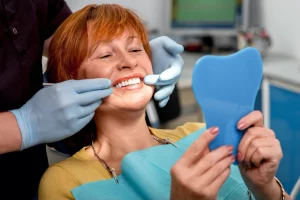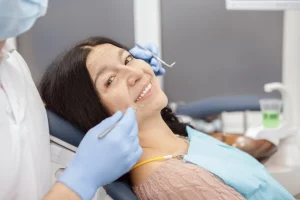
Tooth loss affects how you eat, speak, and smile. It can also lead to shifting teeth and changes in your facial shape. Dentures and partial dentures offer reliable ways to bring back function and confidence. When comparing dentures vs partial dentures, the right choice depends on how many teeth you’ve lost, your oral health, and your lifestyle. In Cortlandt, NY, patients have access to both options through trusted providers like Hudson Valley Dental Medicine. In some cases, restorative solutions like Crowns (Caps) may also be recommended to strengthen remaining natural teeth or improve aesthetics alongside dentures.
What Are Dentures?
Dentures are removable prosthetic devices that replace missing teeth. A full denture replaces an entire arch of teeth on the upper or lower jaw. It sits on the gums and stays in place with suction or adhesive.In comparison, Fixed Bridges offer a non-removable option by anchoring replacement teeth to adjacent natural teeth or implants. However, dentures remain a preferred option when many or all teeth are missing.
When Full Dentures Are a Good Fit
-
All or most natural teeth are missing
-
Remaining teeth cannot be saved
-
Gums and bone are healthy enough to support a denture
-
Patient prefers a non-surgical, removable option
Full dentures help restore bite strength and facial volume. Modern designs look more natural and feel more comfortable than in the past. Dentures can also improve speech and reduce facial sagging caused by tooth loss.
What Are Partial Dentures?
Partial dentures replace several missing teeth while preserving the rest of your natural ones. They attach to nearby teeth with clasps or precision attachments and are custom-made to match your bite and smile.
When Partial Dentures Make Sense
-
Some healthy teeth remain in the arch
-
Patient wants a removable solution without surgery
-
Teeth near the gap are strong enough to support the denture
-
Patient prefers to avoid dental implants or bridges
Partial dentures fill the space between natural teeth. They prevent nearby teeth from shifting and help maintain alignment. Since they rely on surrounding teeth for support, the fit is often more stable than full dentures.
Key Differences Between Dentures and Partial Dentures
Choosing the right type starts with understanding how they compare.
Number of Missing Teeth
-
Full Dentures: Used when all teeth in the upper or lower arch are gone
-
Partial Dentures: Used when several teeth are missing but others remain
Support Structure
-
Full Dentures: Rest directly on the gums
-
Partial Dentures: Use remaining teeth for support
Fit and Stability
-
Full dentures depend on suction or adhesive
-
Partial dentures attach more securely using clasps or connectors
Material and Appearance
Both options are made from acrylic, resin, or metal with tooth-colored materials. Partial dentures often include a metal framework for added support, while full dentures use a complete acrylic base.
Pros and Cons of Full Dentures
Dentures restore an entire arch, making them a full-coverage solution. They help patients regain their smile and chewing function, even with significant tooth loss.
Pros
-
Replace a full set of missing teeth
-
Improve chewing and speaking
-
Restore facial shape and volume
-
Lower cost compared to implants
Cons
-
May feel less stable than other options
-
Require regular adjustments as gums change
-
Need adhesive for better retention
-
Must be removed for cleaning
Dentures are ideal for patients who have lost all their teeth and want a non-surgical method to regain function.
Pros and Cons of Partial Dentures
Partial dentures support the natural structure of your mouth and preserve remaining teeth. They fill gaps while blending in with your smile.
Pros
-
Keep healthy teeth in place
-
Provide stability through clasps or attachments
-
Less bulky than full dentures
-
Easier to adapt to for first-time users
Cons
-
Clasps may be visible depending on placement
-
Require proper cleaning to avoid plaque buildup
-
May need periodic tightening or repair
Partial dentures are a great middle ground for patients who want to maintain their existing teeth while filling in missing spots.
How to Choose the Right Option in Cortlandt, NY
Both dentures and partial dentures improve oral health and appearance, but one may suit your needs better based on your current dental condition.
Consider the Number of Missing Teeth
If all your teeth are missing in a jaw, full dentures offer full coverage. If you still have several strong teeth, partial dentures allow you to keep them while restoring your bite.
Think About Comfort and Fit
Some patients find full dentures bulky or hard to get used to. Partial dentures often feel more natural and stable since they attach to nearby teeth. Your dentist can help assess your jaw structure and comfort level with each type.
Evaluate Oral Health and Bone Support
The fit of dentures depends on gum and bone support. If you’ve experienced gum recession or bone loss, you may need adjustments or relines for a proper fit. A dental exam will reveal which option works best with your current health.
Look at Long-Term Maintenance
Both types require daily care. You’ll need to clean them properly, avoid damage, and attend regular checkups. Full dentures need relining over time as your gums shrink. Partial dentures might need adjustment if your natural teeth shift.
What to Expect During the Process
Getting Full Dentures
-
Your dentist removes any remaining teeth
-
Impressions of your mouth are taken
-
A custom denture is created and adjusted for fit
-
Follow-up visits help improve comfort and function
Some patients choose immediate dentures placed the same day as tooth extraction. These allow for healing while still providing function and appearance.
Getting Partial Dentures
-
Your dentist takes impressions of your mouth
-
A dental lab creates a custom partial to match your bite
-
Clasps or connectors are added to support the frame
-
Adjustments are made for comfort and balance
Both procedures include follow-up care to fine-tune the fit and teach you how to clean and wear your dentures.
How Hudson Valley Dental Medicine Can Help
Hudson Valley Dental Medicine offers complete denture services in Cortlandt, NY. Dr. Francis Turturro provides full and partial dentures using modern materials that look natural and feel comfortable. The team focuses on patient comfort, clear communica tion, and long-term care to help you adjust to your new smile with confidence.
Visit hudsonvalleydentalmedicine.com for more information or to request an appointment. You can also call the office or use the Contact Us form online.
Final Thoughts
Dentures and partial dentures each provide reliable tooth replacement. Full dentures work best when all teeth are missing. Partial dentures help when you want to preserve your natural teeth. Both options support oral health, speech, chewing, and confidence.
Choosing the right one depends on your specific needs and comfort. Hudson Valley Dental Medicine can guide you through the decision and build a solution that works for your lifestyle. Contact us today to book an appointment and learn more about your options in Cortlandt, NY.
FAQs
How long do dentures and partial dentures last?
They can last five to ten years with proper care. Regular checkups help maintain their fit.
Will dentures affect how I speak?
You may need a short adjustment period. Most people speak normally after a few days.
Can I eat normally with dentures?
Yes. Start with soft foods and work up to harder textures as you adjust to chewing with them.
How do I clean my dentures?
Remove them daily. Brush with a denture cleaner and soak them overnight. Avoid using regular toothpaste.
Can I sleep while wearing dentures?
It’s better to remove them before sleeping to give your gums a break and prevent irritation.



